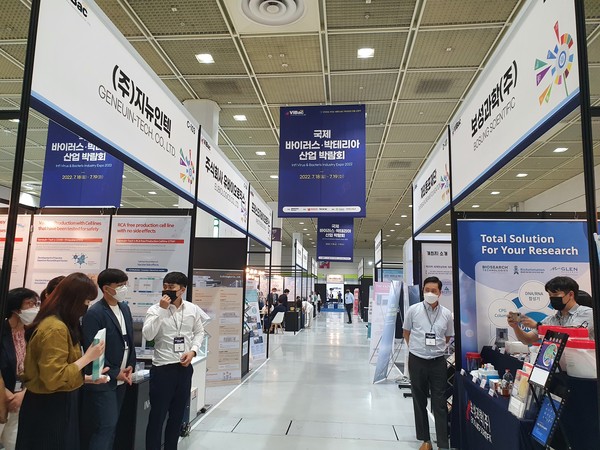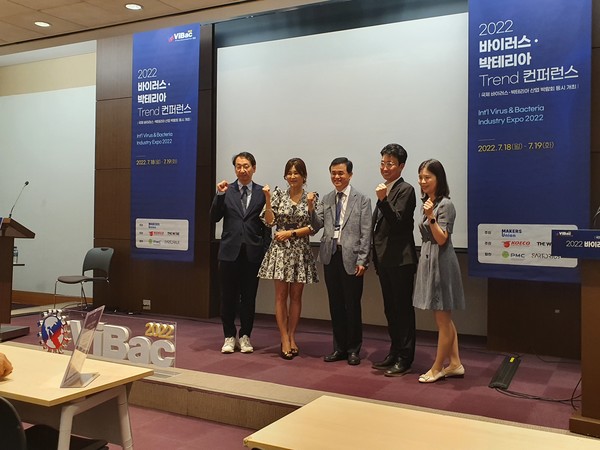The VIBac 2022, a two-day conference and exhibition, kicked off at the COEX in southern Seoul on Monday, featuring Korean and foreign businesses related to the fields of virus and bacteria.

Visitors to the event can access technologies in various areas, including diagnostics, biopharmaceuticals, microbiome and cosmetics, microbial and genetic analysis research and development.
For instance, they run into massive displays of sterilizers using UV, bipolar ionization, and smart LED lights in hospitals and lab equipment for cultures and PCR tests, among others.
Besides, some booths hold virtual displays of their pipeline products, including viral and bacterial vaccines, microbiome therapeutics, nucleic acid extraction kits, and more.
Also attending the two-day event are regulatory and supporting agencies, such as the Korea Health Industry Development Institute (KHIDI), K-Medi Hub, Asia Exchange Association, and one of its U.S. counterparts, Fairfax County Economic Development Authority.
Later in the day, invited speakers from hospitals shared their Covid-19 experiences. Professor Lee Je-hoon of laboratory medicine at the Catholic University of Korea, St. Mary’s Hospital, opened the session, speaking about his hospital’s participation in the WHO global safety network webinar on patient safety.

Professor Lee also highlighted a recent publication regarding practices developed by the hospital’s infection control surveillance working group (ICS-WG) to prevent hospital infections and identify areas for improvement.
Lee pointed out that wearing masks and washing hands were ignored activities at the beginning of the Covid-19 outbreak, emphasizing that patient screening and triaging guidelines and checklists should be frequently updated to match the current Covid-19 situation.
CEO Kim Kyung-sik of Bestian Hospital Seoul addressed the changing role of the hospital in disaster management. Kim emphasized that the heating, ventilation, and air condition (HVAC) systems in hospitals played a big role in maintaining hygienic circulation to prevent the spread of infections, together with the layout of hospital beds segregated into contamination and clean zone to avoid hospital-generated infections. He further advocated for an intensive care unit (ICU) facility with 30 negative pressure rooms, explaining that costs can be reduced by using existing double beds.
Professor Kim Sang-il of internal medicine at Yangji Hospital shared the hospital’s Covid-19 responses, which gained them international recognition.
One of those responses was the walkthrough installation, which greatly increased the testing capacity at the hospital and was featured on various international media sites like the Washington Post, National Geographic, Harvard Business Review, and others. He also said a partnership with LG U plus created an AI-based patient screening system to reduce contact and hospital entry and exit times.
“All these accomplishments were possible thanks to the efforts of teamwork. However, failures along the way are inevitable, but small successes will start to appear if efforts are continuously made,” Kim said.

